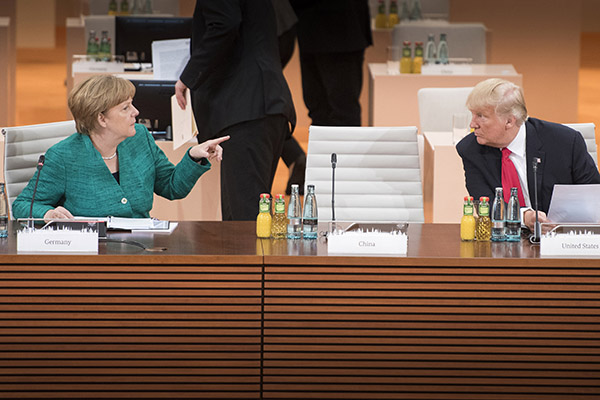
With his hostile stance on the Paris climate change agreement, Trump subverted the G7 (which had already thrown out Russia). His nationalist and protectionist “America First” posture in Hamburg did not paralyse the G20, but it did to a large extent render it hollow, despite the lengthy list of contents in the final declaration and other documents, which condemn protectionism and international terrorism, set up an action plan for growth and an initiative for Africa, and even include, among other proposals, a commitment to fighting for youth employment in rural areas and the training of young women. But the problem of the G20 has never been what it says – although negotiating agreements involves a great deal of diplomatic effort – but rather what it does not say and, above all, what it does not do. To some extent the Hamburg summit was saved from becoming an agreement of the G19, in other words minus the US. But nothing guarantees that we do not face the prospect of a G-Zero. “The world has never been so divided”, said the French president, Emmanuel Macron, in Hamburg. In fact it has been, but this is a different, much more interconnected world – the slogan of this G20 – both for good and ill.
So who calls the shots in the world? At the moment, no-one, not even a group. Trump had previously expressed regret in Warsaw that the West had fallen behind, but the West has not only been left leaderless (nobody trusts Trump): it is an essentially globalising concept and the current president of the US is a “de-globaliser”. It may be temporary, lasting as long as Trump does in the White House, but the causes responsible for Trump should not be forgotten, because there are underlying tendencies that show the roots go deep and pre-date him.
The question is whether there can be global governance without the United States, the largest economy on the planet, the greatest military, technological and cultural power, although in these four aspects it is losing ground. Can the others continue managing the world without American collaboration and can the US act as it pleases? It is possible for the terms of the Paris Agreement to be honoured if the others fulfil them. According to the Hamburg declaration “the leaders of the other G20 members state that the Paris Agreement is irreversible”. Even the US may end up complying in part, because some of its individual states, cities and large companies are committed to it, in a sort of sub-state global governance. But in this, as in all other areas, it will be difficult to achieve anything substantial without the collaboration of the US.
This is firstly because “the others”, the remainder, do not comprise a bloc, but rather have highly diverse interests. Witness, for example, the divergence between Beijing and the EU, with the latter refusing to grant China the status of market economy at the World Trade Organisation, because this would limit Europe’s capacity to institute antidumping proceedings against Chinese imports. There are also the EU measures against the excessive penetration of Chinese steel. There are other differences, like French and German resistance to certain Chinese investments in strategic sectors (such as robotics and energy). This is without mentioning human rights and the treatment meted out to the Nobel Peace Prize winner, Liu Xiaobo.
It is however important that “the others” keep a torch burning for common sense and the integration of trade. The political agreement between Japan and the EU for a far-reaching trade deal, albeit with some major holes, is a significant step forward. The two parties represent 19% of the world’s GDP and 38% of the export of goods. Japan is also trying to revive the Trans-Pacific Partnership (TPP), from which the US has withdrawn, and Europe is pursuing deals with, for example, Mercosur and Africa. But even acting jointly, Japan and Europe lack sufficient capacity to structure the world.
The US will shortly take steps – delayed until after the G20 summit – against steel imports, essentially affecting China and the Europeans, who will be obliged to respond in what could be an escalation. The US protectionist spiral did not start with Trump, but there are alarming signs of it becoming more severe during his mandate. According to a report from Global Trade Alert , which monitors the G20, in the first six months of the year, in other words under the Trump administration, the US has introduced at all levels 26% more measures against the interests of other countries than in the same period of the previous year, while the rest of the G20 has refrained from following a similar approach against American interests. But the report also states that at the end of 2016 there were still 2,420 protectionist measures harming US commercial interests. In other words, despite the years it has spent talking about the issue, the G20 has done little for world trade. Indeed, the study claims that since 2008 the G20 countries have introduced more than 11,000 protectionist measures.
But it is not just a question of trade and protectionism, or the fight against climate change. All this, and the US withdrawal from the world stage under Trump, is liable to have geopolitical consequences. At these times marked by, for example, the crisis with North Korea (where Trump has gone back to the position of needing China’s cooperation), with Qatar, with Syria (where there is a rapprochement between the US and Russia, with an announcement of a ceasefire in the south-east), and with ISIS and jihadist terrorism, there was agreement at the G20, and above all in the crucial bilateral meetings. The G20 was created primarily to address – in a coordinated rather than an integrated way – economic issues, and its early summits, meetings of heads of state and government leaders, were first held as a response to the crisis unleashed by the collapse of Lehman Brothers. Almost a decade later, many of its members appear to be diverging in their economic stances, and it is perhaps not the best forum for addressing geopolitical issues.
The meeting does not seem to have been especially important to Trump, who was more concerned about his encounters with Vladimir Putin, Xi Jinping and Theresa May than with the G20 per se. As his National Security Advisor, H.R. McMaster, and his economic advisor, Gary Cohn, had already pointed out, Trump does not see the world as a “global community” requiring cooperation but as an “arena” in which one has to fight one’s corner. As things stand, in the aftermath of this G20, we seem to be facing the prospect of what Ian Bremmer six years ago called, in very different circumstances, a G-Zero (unlike now, it was not due to the stance of a US president and the electoral base that supports him). Given the extent of the problems that are building up, it is a worrying situation indeed.


